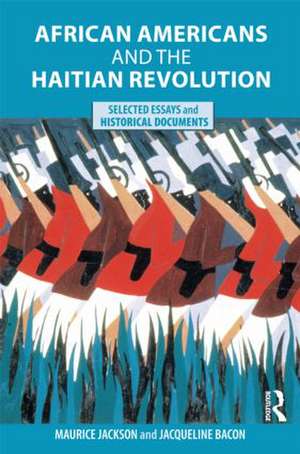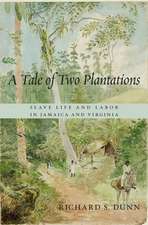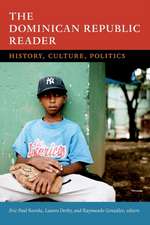African Americans and the Haitian Revolution: Selected Essays and Historical Documents
Editat de Maurice Jackson, Jacqueline Baconen Limba Engleză Paperback – 27 oct 2009
| Toate formatele și edițiile | Preț | Express |
|---|---|---|
| Paperback (1) | 386.77 lei 6-8 săpt. | |
| Taylor & Francis – 27 oct 2009 | 386.77 lei 6-8 săpt. | |
| Hardback (1) | 1220.49 lei 6-8 săpt. | |
| Taylor & Francis – 27 oct 2009 | 1220.49 lei 6-8 săpt. |
Preț: 386.77 lei
Nou
Puncte Express: 580
Preț estimativ în valută:
74.02€ • 76.69$ • 61.77£
74.02€ • 76.69$ • 61.77£
Carte tipărită la comandă
Livrare economică 21 martie-04 aprilie
Preluare comenzi: 021 569.72.76
Specificații
ISBN-13: 9780415803762
ISBN-10: 0415803764
Pagini: 272
Ilustrații: 4
Dimensiuni: 156 x 234 x 15 mm
Greutate: 0.39 kg
Ediția:1
Editura: Taylor & Francis
Colecția Routledge
Locul publicării:Oxford, United Kingdom
ISBN-10: 0415803764
Pagini: 272
Ilustrații: 4
Dimensiuni: 156 x 234 x 15 mm
Greutate: 0.39 kg
Ediția:1
Editura: Taylor & Francis
Colecția Routledge
Locul publicării:Oxford, United Kingdom
Public țintă
UndergraduateCuprins
Introduction
Maurice Jackson and Jacqueline Bacon
Part One: Essays
Chapter One: Fever and Fret: The Haitian Revolution and African American Responses
Maurice Jackson and Jacqueline Bacon
Chapter Two: Afro-American Sailors and the International Communication Network: The Case of Newport Bowers
Julius S. Scott
Chapter Three: The Roots of Early Black Nationalism: Northern African Americans' Invocations of Haiti in the Early Nineteenth Century
Sara C. Fanning
Chapter Four: "The Black Republic:" The Influence of the Haitian Revolution on Northern Black Political Consciousness, 1816-1862
Leslie M. Alexander
Chapter Five: "A Revolution Unexampled in the History of Man": The Haitian Revolution in Freedom’s Journal, 1827-1829
Jacqueline Bacon
Chapter Six: Antebellum African Americans, Public Commemoration, and the Haitian Revolution: A Problem of Historical Mythmaking
Mitch Kachun
Chapter Seven: American Toussaints: Symbol, Subversion, and the Black Atlantic Tradition in the American Civil War
Matthew J. Clavin
Chapter Eight: "The Spirit of Human Brotherhood," "The Sisterhood of Nations," and "Perfect Manhood": Frederick Douglass and the Rhetorical Significance of the Haitian Revolution
Glen McClish
Chapter Nine: No Man Could Hinder Him: Remembering the Haitian Revolution in the History, Music, Art and Culture of the African American People
Maurice Jackson
Part Two: Historical Documents
"The Condition and Prospects of Hayti" (1826)
John Browne Russwurm
The Haitian Revolution in Freedom’s Journal, the first African American Newspaper (1827-1828)
From A Lecture on the Haytien Revolutions; With a Sketch of the Character of Toussaint L'Ouverture. Delivered at the Stuyvesant Institute, (For the Benefit of the Colored Orphan Asylum,) February 26, 1841.
James McCune Smith
From St. Domingo: Its Revolutions and its Patriots. A Lecture, Delivered before the Metropolitan Athenaeum, London, May 16, and at St. Thomas' Church, Philadelphia, December 20, 1854
William Wells Brown
From A Vindication of the Capacity of the Negro Race for Self-Government, and Civilized Progress, as Demonstrated by Historical Events of the Haytian Revolution; and the Subsequent Acts of that People Since Their National Independence (1857)
James Theodore Holly
The Haitian Revolution in Resolutions Adopted by African American State and Regional Conventions (1858, 1859, 1865)
From Men of Mark: Eminent, Progressive, and Rising (1887)
William J. Simmons
From Lecture on Haiti. The Haitian Pavilion Dedication Ceremonies Delivered at the World’s Fair, in Jackson Park, Chicago, Jan. 2d, 1893
Frederick Douglass
"The Same" (1932)
Langston Hughes
From A History of Pan-African Revolt (1938 [1969])
C. L. R. James
"Mister Toussan" (1941)
Ralph Ellison
"Ho Chi Minh is Toussaint L’Ouverture of Indo-China" (1954)
Paul Robeson
Bibliography
Contributors
Maurice Jackson and Jacqueline Bacon
Part One: Essays
Chapter One: Fever and Fret: The Haitian Revolution and African American Responses
Maurice Jackson and Jacqueline Bacon
Chapter Two: Afro-American Sailors and the International Communication Network: The Case of Newport Bowers
Julius S. Scott
Chapter Three: The Roots of Early Black Nationalism: Northern African Americans' Invocations of Haiti in the Early Nineteenth Century
Sara C. Fanning
Chapter Four: "The Black Republic:" The Influence of the Haitian Revolution on Northern Black Political Consciousness, 1816-1862
Leslie M. Alexander
Chapter Five: "A Revolution Unexampled in the History of Man": The Haitian Revolution in Freedom’s Journal, 1827-1829
Jacqueline Bacon
Chapter Six: Antebellum African Americans, Public Commemoration, and the Haitian Revolution: A Problem of Historical Mythmaking
Mitch Kachun
Chapter Seven: American Toussaints: Symbol, Subversion, and the Black Atlantic Tradition in the American Civil War
Matthew J. Clavin
Chapter Eight: "The Spirit of Human Brotherhood," "The Sisterhood of Nations," and "Perfect Manhood": Frederick Douglass and the Rhetorical Significance of the Haitian Revolution
Glen McClish
Chapter Nine: No Man Could Hinder Him: Remembering the Haitian Revolution in the History, Music, Art and Culture of the African American People
Maurice Jackson
Part Two: Historical Documents
"The Condition and Prospects of Hayti" (1826)
John Browne Russwurm
The Haitian Revolution in Freedom’s Journal, the first African American Newspaper (1827-1828)
From A Lecture on the Haytien Revolutions; With a Sketch of the Character of Toussaint L'Ouverture. Delivered at the Stuyvesant Institute, (For the Benefit of the Colored Orphan Asylum,) February 26, 1841.
James McCune Smith
From St. Domingo: Its Revolutions and its Patriots. A Lecture, Delivered before the Metropolitan Athenaeum, London, May 16, and at St. Thomas' Church, Philadelphia, December 20, 1854
William Wells Brown
From A Vindication of the Capacity of the Negro Race for Self-Government, and Civilized Progress, as Demonstrated by Historical Events of the Haytian Revolution; and the Subsequent Acts of that People Since Their National Independence (1857)
James Theodore Holly
The Haitian Revolution in Resolutions Adopted by African American State and Regional Conventions (1858, 1859, 1865)
From Men of Mark: Eminent, Progressive, and Rising (1887)
William J. Simmons
From Lecture on Haiti. The Haitian Pavilion Dedication Ceremonies Delivered at the World’s Fair, in Jackson Park, Chicago, Jan. 2d, 1893
Frederick Douglass
"The Same" (1932)
Langston Hughes
From A History of Pan-African Revolt (1938 [1969])
C. L. R. James
"Mister Toussan" (1941)
Ralph Ellison
"Ho Chi Minh is Toussaint L’Ouverture of Indo-China" (1954)
Paul Robeson
Bibliography
Contributors
Recenzii
"This is a timely and enterprising collection that answers a growing need to set African American history in a broader international context. It combines essays that are diverse in approach with a wide-ranging selection of documents."
–Wendy Asquith, University of Liverpool
- David Patrick Geggus, co-editor of The World of the Haitian Revolution
- David Barry Gaspar, author of A Turbulent Time: The French Revolution and the Greater Caribbean
- Patrick Rael, author of African-American Activism before the Civil War: A Reader on the Freedom Struggle in the Antebellum North
–Wendy Asquith, University of Liverpool











